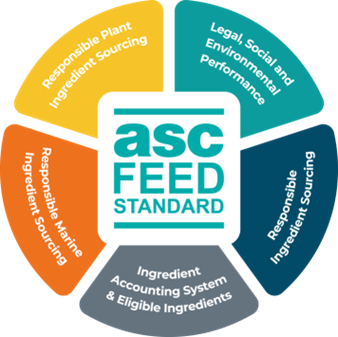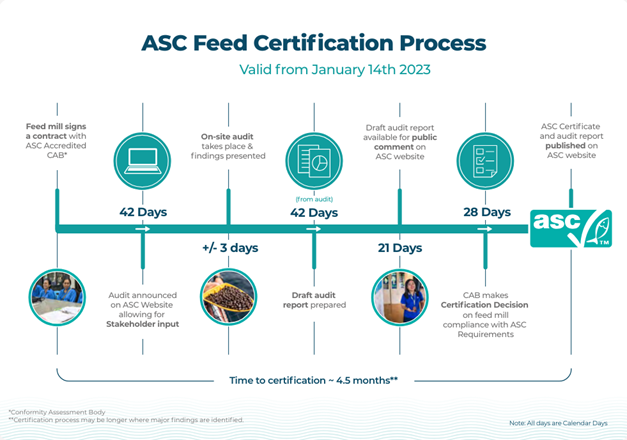About ASC’s Feed Standard
ASC’s Feed Standard tackles one of the biggest potential environmental and social impacts of aquaculture – the production and supply of feed for farmed fish. The ASC Feed Standard is the first standard to take into consideration the impacts created across all key ingredient groups and throughout the ingredient supply chain, in alignment with upcoming European Union regulations. This includes all major agriculture crops such as wheat, corn and canola, in addition to soy and palm oil, and marine ingredients.
ASC’s Feed Standard requires that feed mills meet strict environmental and social requirements; source ingredients from socially responsible suppliers; and use environmentally responsible raw materials. The Feed Standard was launched on 15 June 2021 and became effective on 14 January 2023.
ASC-certified Farms have until October 2025 to change their feed supply to come from mills certified against the Feed Standard. The change in feed supply is necessary for producers to continue meeting the ASC Farm Standards and to retain their certification.
Why do we need more responsible feed?
- More than 70% of farmed seafood (excluding algae) is fed
- Life cycle assessments indicate that feed can account for up to 90% of the environmental impacts of fed aquaculture production (Little et al 2018)
- More than 90% of those impacts typically occur during the production and harvesting of raw materials for feed—through deforestation, land conversion, fisheries management, agricultural practices and more
- In 2020, over 58 million people were employed in fisheries and aquaculture globally (FAO SOFIA report 2022)
ASC-certified feed mills demonstrate positive impacts across five areas:

Feed for the future: ASC’s vision for feed
Aquaculture is the fastest-growing source of protein globally. Our mission is to transform the sector towards more environmentally and socially responsible practices, using efficient market mechanisms that create value across the chain.
A key part of that is ensuring enough responsibly sourced feed is available to support this growth. The Feed Standard contributes to more responsible seafood farming practices globally by making sure every feed ingredient is risk assessed for impacts on people and our planet, and best practices in feed supply chains are recognised.
Feed ingredients may have different environmental and social impacts depending on the type of ingredient, location and production method. For example:
- Soy may have deforestation and land conversion risk
- Other plant ingredients may risk ecosystem conversion
- Fishmeal and fish oil risk depleting a finite resource
Risk assessments will be conducted on the majority of ingredients (greater than 1% inclusion) used in feed.
GETTING CERTIFIED: FEED MILLS
Demonstrate that you produce your feed with care. Find out how to start your journey to ASC Feed Standard certification below.
- The ASC Feed Standard became effective in January 2023. ASC-certified farms have until October 2025 to transition to ASC-compliant feed produced under the ASC Feed Standard to continue meeting the ASC Farm Standards.

WHY CHOOSE BV?
Achieving ASC Feed Certification with Bureau Veritas offers a strong benefit to leverage an extensive expertise and experience with responsible seafood industry players as ASC farm certified for many species and feed mill production.
Our robust audit process and our network of experts in multiple disciplines such as social, food safety or quality compliance give us the best position to support stakeholders looking to improve their sustainability commitments:
Through our focus on food sustainability, Bureau Veritas is helping to shape a future where the food industry not only meets the current needs without compromising the ability of future generations to meet their own needs but also contributes to a healthier planet. This strategic integration demonstrates how companies can play a critical role in addressing global challenges, turning the sustainability imperative into opportunities for innovation and leadership in their sectors.
